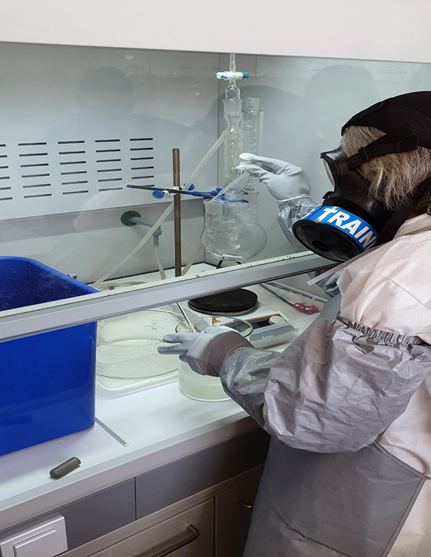- Expert guidance for lab designer
- Laboratory equipment lists
- Working instructions and standard operating procedures
- Specialist laboratory training
- Accreditation, international designation and proficiency testing

Comprehensive training programs are necessary to ensure operational readiness of a CBRN Laboratory.

Training Topics
CBRNE BASICS COURSE
- CW&CWA: Intro, CWA properties, environmental fate, military and terrorist delivery means, medical effects
- TIC&TIM: Chemical agents of opportunity for terrorism, Intro, properties.
- BW&BWA: Intro, BWA properties, environmental fate, military, and terrorist delivery means

- RAD: Intro, Radionuclides & dirty bombs, properties, environmental fate, terrorist delivery means
- Explosives: Intro, properties, environmental fate
- CBRNE protection: fitting the protective equipment, risk assessment.
- CBRNE detection: technologies, strategies, examples, application
- CBRNE decontamination: requirements, principles, personal decontamination, end result
- CBRNE sampling and chain of custody procedures
- Hazard categorization of unknowns: theory and practice
- Forensic awareness and Forensic aspects of CBRNE terrorism
- Medical emergency procedures

ANALYTICAL SKILLS DEVELOPMENT COURSE
A training package consists of two basic modules:
- Module: theoretical and practical training in basic aspects of analysis of threat agents listed under the scope of relevant compartment of the CBRN lab. Demonstrations and individual exercises covering hardware use, maintenance and optimization, system validation, running and troubleshooting.
- Module: sample preparation methods for the specific analytical techniques, both theoretical and hands-on training. Application of analytical methods from Module 1. Independent problem-solving exercises, S&A.


ADVANCED ANALYTICAL SKILLS DEVELOPMENT COURSE
A training package consisting of modules. The modules are focused on the use of advanced analytical methods and on Laboratory Quality Management (LQM). Aspects of sample preparation, compound identification, reporting and laboratory quality management based on ISO 17025 standard are also covered.
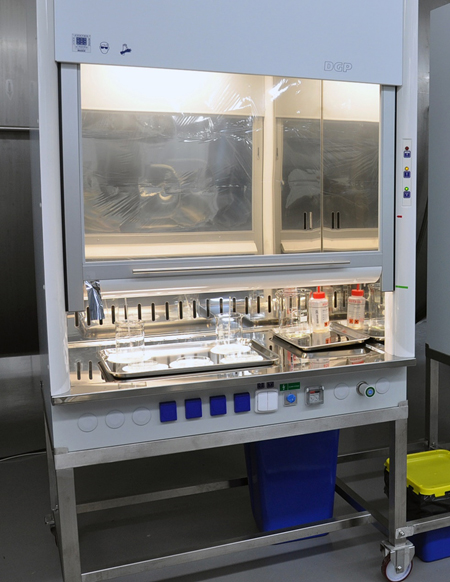


LIVE AGENT TRAINING COURSE
- Live CBRNE agent handling procedures: transfer, storage, safety measures, risk assessment, decontamination, waste management
- CBRNE agent properties – laboratory/ field demonstration and exercises
- CBRNE agent detection – laboratory/ field exercises
- CBRNE agent sampling and chain of custody – laboratory/ field exercise
- CBRNE agent analysis – laboratory/ field
- CBRN agents – first aid emergency measures
- Scenario based exercises, authentic operational situations.

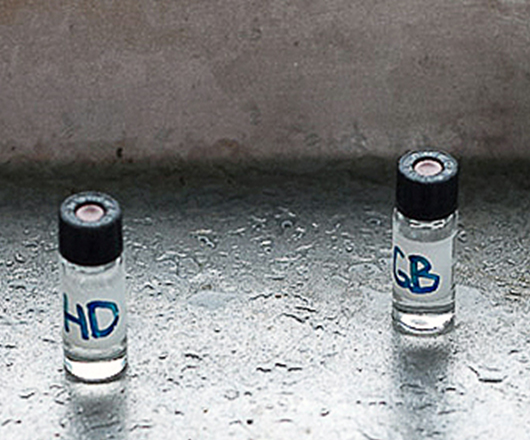
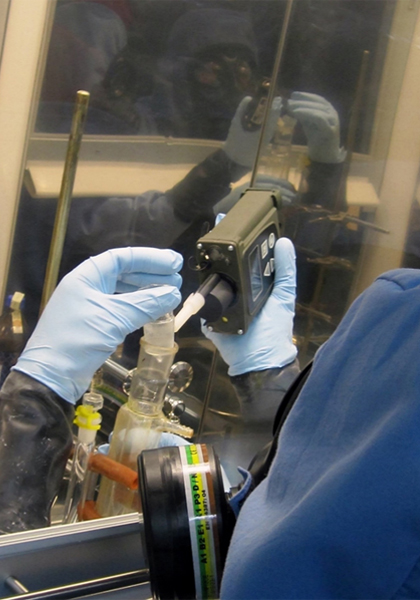

LABORATORY SYSTEM TRAINING
- Good laboratory practices implementation
- Laboratory system operation: sample receipt, processing, analysis, registering, chain of custody procedures, sample reporting, medical emergency measures
- Laboratory system maintenance and waste handling
- Laboratory system troubleshooting
- Laboratory proficiency test
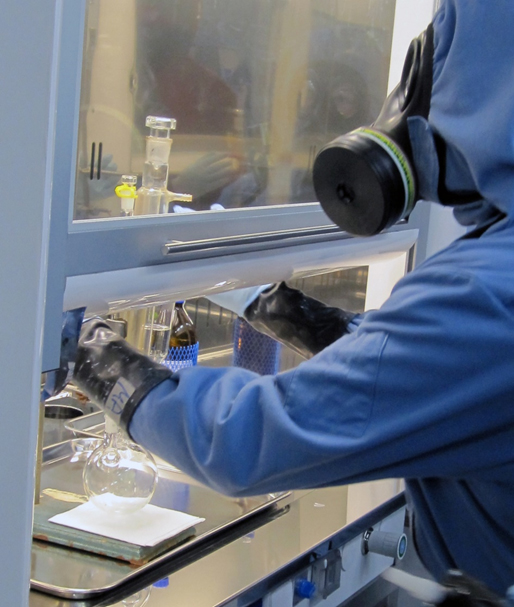

SPECIALISED CERTIFIED COURSES: Biosafety and Bio Risk
- The specific elements of Laboratory Biorisk Management
- Laboratory Biosafety Laws and Guidelines
- Laboratory Biosafety and Biosecurity
- Regulatory Challenges for Biosafety and Biosecurity
- Primary and Secondary Containment
- Safe Microbiological Practice
- Disinfection, Decontamination and BioWaste
- Laboratory Incidents and Accidents
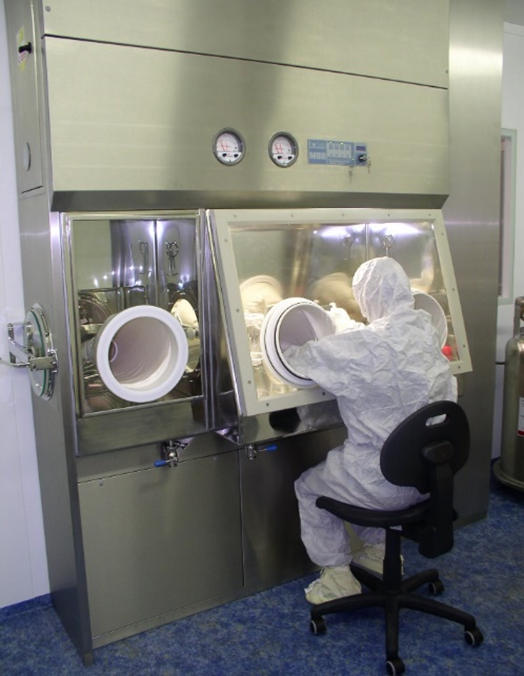

SPECIALISED CERTIFIED COURSES: Basic Radiation Safety and Security
- Radiation safety and security concept in RN lab;
- Specific elements of RN lab management;
- Types of radiation sources and samples in the RN lab (types of radiation);
- Practical principles of radiation protection measures in the RN lab;
- Principle of establishing radiation safety zones in RN lab;

- Workplace radiation monitoring;
- Individual monitoring;
- Use of protective equipment (personal and collective);
- Basic decontamination principles of the workplace and humans;
- Basic principles of radioactive waste management in the RN lab;
- Emergency preparedness and response (possible accident scenarios, actions to be taken, medical and evacuation procedure, taking care of contaminated staff, etc.);
- Radiation security principles and measures in the RN lab
- Records keeping (radiation exposure, sources, monitoring, etc.);
- Introduction to national and international rules and regulations

ADVANCED LABORATORY RADIATION SAFETY AND RISK TRAINING COURSE
- Special type of instruments and radiation detection techniques and procedures used in RN lab (Direct and indirect measurements of contamination levels, dose/dose rate measurements in the practice, etc.);
- Radiation protection program requirements in RN lab;
- Monitoring program design for internal and external exposure in RN lab;
- Emergency preparedness and response plans;
- Waste management procedures;
- Detailed familiarization with the requirements of national regulations in the field of radiation safety and security
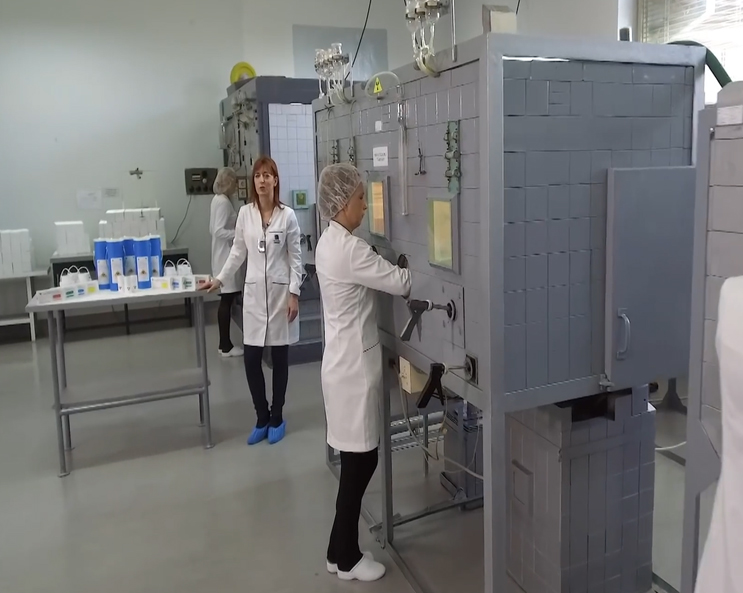

COURSE IN USE OF HAND-HELD RADIATION DETECTORS AND SURVEY INSTRUMENTATION
- Radiation quantities and units;
- Measurement and other characteristics of the instruments;
- Principles of adequate selection of instrumentation in practice;
- Daily check of instrument operation, calibration and settings;
- Proper calculation of the efficiency, MDA, background levels, etc.;
- Proper usage of the instruments on the field;
- Selection of the proper measurement procedure and technique in the practice;
- Determination of uncertainty in measurements;
- Instrument maintenance and storage
NATIONAL COURSE FOR RADIATION SAFETY OFFICERS
- Radiation and radioactivity;
- Radiation quantities and units;
- Radiation detection, instrumentation and dosimetry;
- Radiation protection principles and safety of radioactive sources;
- Biological and health effects of exposure to radiation;
- General requirements of the International Safety Standards for Radiation Protection and the Safety of Radiation Sources;
NATIONAL COURSE FOR RADIATION SAFETY OFFICERS
- Radiation protection principles and practices, including contamination control;
- Workplace radiation safety program: organization and administration;
- Emergency procedures;
- Workplace inspections and audits;
- Role and duties of radiation protection officers;
- Licensing procedures;
- Employee training;

TRAINING COURSE IN DECONTAMINATION OF WORKING AREAS
- Special type of instruments and radiation detection techniques and procedures used in RN lab (Direct and indirect measurements of contamination levels, dose/dose rate measurements in the practice, etc.);
- Radiation protection program requirements in RN lab;
- Monitoring program design for internal and external exposure in RN lab;
- Chemical warfare agent decontamination
- Emergency preparedness and response plans;
- Waste management procedures;
- Detailed familiarization with the requirements of national regulations in the field of radiation safety and security
